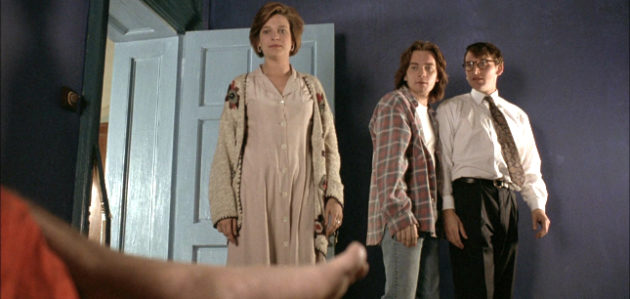Inessential Essentials: Danny Boyle's Shallow Grave Gets the Criterion Treatment

The film: Shallow Grave (1994)
Why It's an Inessential Essential: Today, Danny Boyle is commonly known as "the director of Slumdog Millionaire." (Or: Olympian designer!) After that, he's usually "the director of Trainspotting," or 127 Hours or even Millions. So it's nice to see that the Criterion Collection's first DVD/Blu-Ray release of a Boyle film is Shallow Grave, an early film by Boyle but an especially worthy one. Scripted by regular collaborator John Hodge (Trainspotting, A Life Less Ordinary), Shallow Grave is a nasty little neo-noir about three apathetic yuppies that cover up a crime involving a dead body and a bag full of cash.
Juliet (Kerry Fox), Alex (Ewan McGregor in his second film role), and David (Doctor Who's Christopher Eccleston) are a trio of casually petty young things that are equally bored, cruel and self-absorbed. They tentatively sublet the fourth bedroom in their Edinburgh flat to a stranger, who promptly dies and leaves a suitcase full of money beside his corpse. A decision is hastily made: they'll keep the money and dispose of the body. The consequences of that decision naturally haunt and subsequently push the film's group of sociopathic friends over the edge.
How the DVD/Blu Ray Makes the Case for the Film: During his audio commentary soundtrack, Boyle behaves exactly how you'd think he would based on his films. He's a reactive filmmaker, one that prioritizes sensationalism over moralism. That totally suits a film like Shallow Grave, a movie that Boyle, according to film critic Philip Kemp's liner notes, originally conceived of as being similar to Blood Simple.
During the director's commentary (there's also a separate commentary track that features Hodge in conversation with producer Andrew Macdonald), Boyle professes to have great reverence for British social realists like Ken Loach and Mike Leigh. But he also talks about how the film's bright, lurid color palette, which he characterizes as "swathes of color," were his way of getting away from "British realism," which he said had "become very standard" at the time. Shallow Grave is about the perils of being young, British, materialistic and without a moral compass. But like Trainspotting, Boyle's follow-up feature and breakthrough film, Shallow Grave, is a young filmmaker's way of trying to, "just smash it up a bit, if we could."
Left to his own devices, Boyle tellingly only mentions the film's political subtext infrequently and mostly in passing. He's much more interested in talking about trick shots, effect-driven photography and the sense of visual "perspective" he achieved by making his antiheroes' apartment, the film's central location, built with an elevated foundation. Boyle did this for the same reason he had his cast lug around a crash test dummy when they simulated carrying a body down a flight of stairs. Boyle knew even then that to properly push buttons, he had to achieve a hyper-real effect. And he did: Boyle jokes that the dummy made his three lead actors mad at him, but that that an air of tension on-set is, "always a good thing."
Other trivia: Boyle is a great talker and goes on a number of funny tangents during his audio commentary, like when he warns anyone unfamiliar with The Wicker Man, which is playing in the background in one scene in Shallow Grave, not to watch the remake. His anecdote about gauging the success of Shallow Grave on the attendance of a single matinee screening in Hamilton, Scotland is especially funny. Boyle says that his contacts at Polygram Filmed Entertainment, the film's distribution company, informed him that four people showed up to Hamilton's first screening, but that that was a very good sign. "If there's one person there," Boyle recalled, "it's going to be ok. If there's nobody there, they don't know. It's bizarre, it's all statistics, of course."
Previously: Inessential Essentials: Revisiting Joe Eszterhas's Telling Lies in America
Simon Abrams is a NY-based freelance film critic whose work has been featured in outlets like The Village Voice, Time Out New York, Vulture and Esquire. Additionally, some people like his writing, which he collects at Extended Cut.

Comments
Thanks again for the blog article. Great.
Zhu Hai City mind is still very clever, he immediately realize that this was to use the confidential Xu Meng benefits, like smooth disputes between him and Liu Yiyi, Zhu Hai city can Haicheng trade development to this point of course is not an ordinary person, he was afraid of death owned by the fear of death, when the know when temporarily not die, but not to be confused Xu Meng led by the nose, and even bite him.